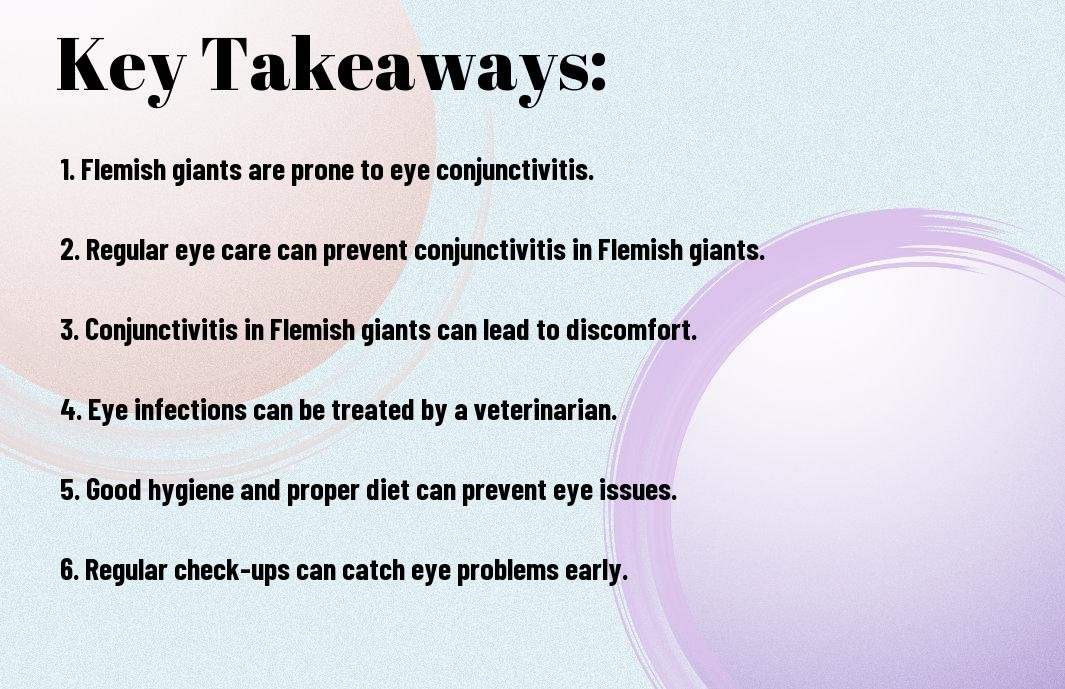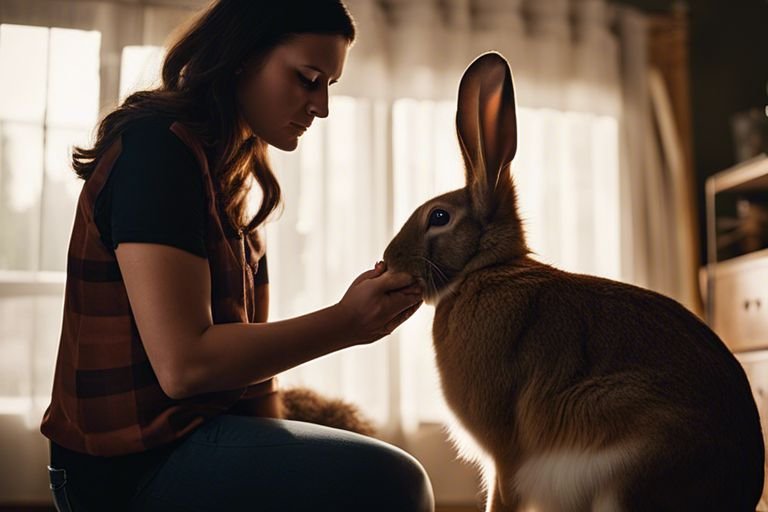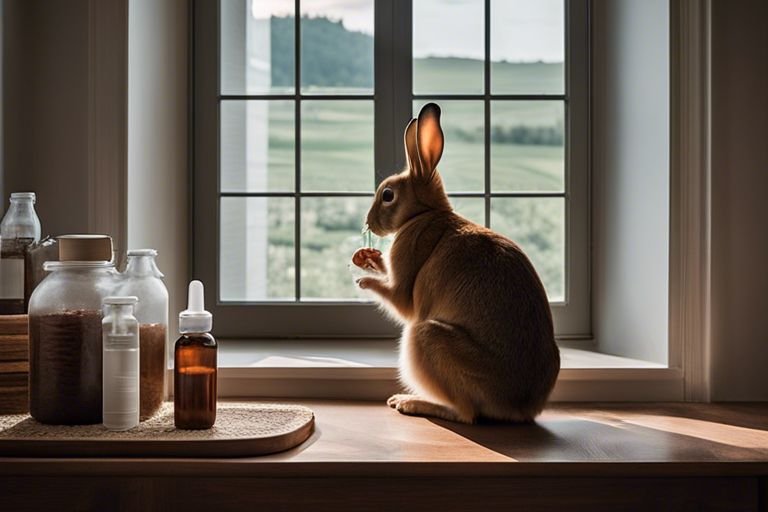You may be wondering whether eye conjunctivitis is a major concern for you as a Flemish Giant rabbit owner. Conjunctivitis in Flemish Giants can indeed be a serious issue that affects your rabbit’s eyesight and overall health. Because of their large size, these rabbits are more prone to developing eye problems, including conjunctivitis. It is important to monitor your rabbit’s eyes regularly and seek veterinary care at the first sign of any irritation or discharge. Conjunctivitis can lead to more severe issues if left untreated, so it is crucial to address any eye problems promptly. By being proactive about your rabbit’s eye health, you can help prevent more serious consequences and ensure your Flemish Giant leads a happy, healthy life.
Key Takeaways:
- Flemish Giants are prone to eye conjunctivitis: Owners of these rabbits should be aware that they are susceptible to developing eye conjunctivitis, a common condition for this breed.
- Regular monitoring is essential: Keeping a close eye on the rabbit’s eyes and seeking veterinary help at the first sign of redness or discharge is crucial in preventing the condition from worsening.
- Preventive measures can help: Regular grooming, a clean living environment, and providing a balanced diet can help reduce the risk of eye conjunctivitis in Flemish Giants.
- Consult a veterinarian for treatment: If a Flemish Giant develops conjunctivitis, it is important to seek professional veterinary care for proper diagnosis and treatment.
- Eye health is critical for overall well-being: Ensuring good eye health in Flemish Giants is essential for their overall well-being and quality of life.

Flemish Giant Health Overview
Any responsible Flemish Giant owner knows that keeping your pet happy and healthy is a top priority. As with any breed of rabbit, these gentle giants have their own specific health concerns that you need to be aware of in order to provide the best possible care for your furry friend.
Eye Health Issues and Their Prevalence
Eye health issues can be a concern for Flemish Giants, just like any other breed of rabbit. One common problem that can occur is conjunctivitis, which is an inflammation of the outermost layer of the eye and the inner surface of the eyelids. It can be caused by viral or bacterial infections, allergies, or irritants such as dust or hay. It’s important to be aware of the prevalence of eye conjunctivitis in Flemish Giants so that you can keep an eye out for any signs of trouble.
Common Signs of Eye Conjunctivitis
One of the most common signs of eye conjunctivitis in Flemish Giants is redness and swelling around the eye, accompanied by excessive tearing or discharge. You may also notice your rabbit rubbing or scratching at their eye more than usual. If you notice any of these signs, it’s important to take action and seek treatment for your pet as soon as possible to prevent any further complications.
The Role of Regular Check-ups and Vaccinations
Regular check-ups with a veterinarian who is knowledgeable about rabbit health are crucial for maintaining the well-being of your Flemish Giant. Your vet can provide vaccinations and advise you on preventative care measures to help keep your rabbit healthy and reduce the risk of eye conjunctivitis and other health issues. By staying proactive and seeking regular veterinary care for your pet, you can ensure their overall health and happiness.

Preventative Care and Management Strategies
Lastly, let’s talk about preventative care and management strategies for eye conjunctivitis in Flemish Giant rabbits. By taking proactive measures, you can significantly reduce the risk of your rabbit developing this condition.
Importance of Proper Nutrition and Grooming
Ensuring that your Flemish Giant rabbit receives proper nutrition is essential for maintaining their overall health, including eye health. A diet rich in hay, fresh vegetables, and a small amount of pellets will supply the necessary vitamins and minerals to keep their immune system strong. Additionally, regular grooming to prevent fur from getting into their eyes can help reduce the risk of eye irritation and infection.
Parasite Prevention Measures
Another crucial aspect of preventative care is parasite prevention. Parasites, such as mites and fleas, can cause irritation and inflammation in your rabbit’s eyes. Make sure to keep your rabbit’s living environment clean and use appropriate parasite prevention products, as recommended by your veterinarian, to protect your pet from these harmful parasites.
Effective Remedies and When to Seek Veterinary Care
If you notice any signs of eye conjunctivitis in your Flemish Giant rabbit, such as redness, discharge, or excessive tearing, it’s important to take action promptly. Simple home remedies such as gently cleaning the eye with a warm, damp cloth or using saline solution can provide temporary relief. However, if the symptoms persist or worsen, it’s crucial to seek veterinary care. Your veterinarian can provide a proper diagnosis and recommend the most appropriate treatment to alleviate your rabbit’s discomfort and prevent further complications.
Flemish Giant Temperament and Lifestyle
Now, let’s talk about the temperament and lifestyle of Flemish Giants. These rabbits are known for their gentle and friendly nature, making them excellent companions for both individuals and families. They are generally calm and easy-going, and they enjoy spending time with their human companions. Flemish Giants are not as active as some other rabbit breeds, so they do well in both indoor and outdoor living environments.
The Impact of Socialization and Obedience Training
When it comes to Flemish Giants, socialization and obedience training play a crucial role in shaping their behavior. It’s important to socialize your rabbit from a young age, exposing them to different people, animals, and environments. This will help them feel more comfortable and confident in various situations. Additionally, basic obedience training can help you establish a strong bond with your rabbit and ensure that they understand and respond to your commands, making it easier to manage their behavior.
The Interaction between Energy Levels and Health
Another important aspect to consider when owning a Flemish Giant is the interaction between their energy levels and overall health. These rabbits have a naturally calm demeanor, which can sometimes lead to obesity if not managed properly. It’s essential to provide them with regular exercise and a balanced diet to maintain their health. Keep an eye on their weight and adjust their food and activity levels accordingly to prevent any potential health issues.
Advanced Considerations for Flemish Giant Owners
Despite the generally robust health of Flemish Giants, there are still some advanced considerations to keep in mind as a responsible owner. Here are some important factors to consider when caring for your Flemish Giant.
- Regular Eye Care: Keep an eye on your Flemish Giant’s eye health. Check for any signs of conjunctivitis or other eye issues, and consult a veterinarian if you have any concerns. You can also learn more about rabbit eyes at 7 Fun Facts About Rabbit Eyes and 5 Problems to Look …
- Diet and Exercise: Ensure your Flemish Giant has a balanced diet and plenty of opportunities to exercise. This can help prevent obesity and related health issues.
- Regular Vet Check-Ups: Schedule regular check-ups with a rabbit-savvy veterinarian to catch any potential health issues early on.
| Fact about Rabbit Eyes: | Problems to Look Out For: |
| Rabbits have a third eyelid that helps protect their eyes. | Cloudy or swollen eyes can indicate a health issue. |
| Rabbits can see nearly 360 degrees around them without moving their heads. | Watery or crusty eyes may be a sign of conjunctivitis. |
Pet Insurance and Cost of Care
When considering advanced care for your Flemish Giant, it’s important to factor in potential veterinary costs. Pet insurance can provide peace of mind and financial support should your pet require unexpected medical attention. Researching different pet insurance options and understanding the potential cost of care can help you prepare for any future health concerns that may arise.
Understanding and Managing Breed-Specific Challenges
When it comes to Flemish Giants, understanding their specific needs and potential health challenges is crucial. Their large size and propensity for weight-related issues require careful monitoring of diet and exercise. Additionally, being aware of breed-specific health concerns such as musculoskeletal issues can help you proactively manage your Flemish Giant’s health and well-being.
Is Eye Conjunctivitis A Major Concern For Flemish Giant Owners?
Summing up, yes, eye conjunctivitis is a major concern for Flemish Giant owners. As a owner of a Flemish Giant rabbit, it is important for you to be aware of the potential risk factors for conjunctivitis, such as environmental irritants, trauma, or infections. Regularly monitoring your rabbit’s eye health, keeping their living area clean, and seeking prompt veterinary care if any signs of eye irritation or infection arise are essential for preventing, identifying, and treating conjunctivitis. By staying proactive and informed, you can help ensure that your Flemish Giant’s eye health remains in optimal condition.
FAQ
Q: What is eye conjunctivitis in Flemish Giants?
A: Eye conjunctivitis in Flemish Giants is an inflammation of the conjunctiva, the thin, transparent membrane that lines the inner surface of the eyelid and the white part of the eye. It can cause redness, swelling, discharge, and discomfort for the rabbit.
Q: What are the common causes of eye conjunctivitis in Flemish Giants?
A: Eye conjunctivitis in Flemish Giants can be caused by a variety of factors, including bacterial or viral infections, irritants, allergies, or physical trauma. Poor hygiene, inadequate ventilation, and overcrowding in the rabbit’s living environment can also contribute to the development of conjunctivitis.
Q: How can Flemish Giant owners prevent and treat eye conjunctivitis in their rabbits?
A: Preventive measures include maintaining a clean and well-ventilated living environment for the rabbit, providing a balanced diet, and regular health check-ups with a veterinarian. If eye conjunctivitis is suspected, owners should seek veterinary care promptly for a proper diagnosis and treatment plan, which may include antibiotic or anti-inflammatory eye drops or ointments.
